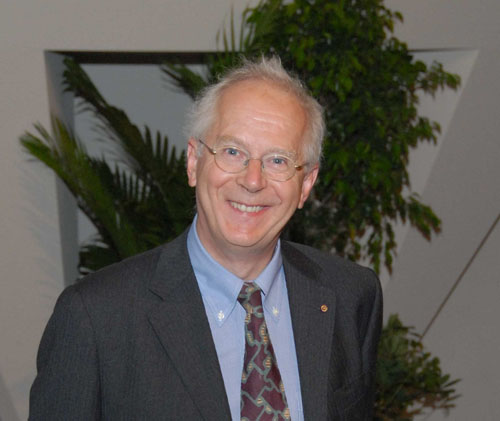David Baulcombe
Sir David Charles Baulcombe ( born July 4, 1952 in Solihull, England ) is a British botanist and professor at the University of Cambridge, England.
Life
Baulcombe 1973 acquired a bachelor's degree in botany at the University of Leeds in 1977 and a Ph.D. in botany at the University of Edinburgh. Points as a post- graduate student led him to the McGill University in Montreal, Canada, and the University of Georgia in Athens, Georgia. From 1980 to 1988 he worked as a scientist at the Plant Breeding Institute in Cambridge, England, before went to the University of East Anglia in Norwich - first as Honorary Professor and Research Director at the John Innes Centre, from 2002 as a professor. Since 2007 he has been a professor of botany at the University of Cambridge, England. At the same time he is Royal Society Research Professor.
Work
Baulcombe dealt intensively with the first potato virus X ( PVX ) and developed the PVX vector, a widely used vector for heterologous gene expression in plant research.
Baulcombe has with his work on plant viruses elucidated fundamental mechanisms of gene silencing and small interfering RNA ( siRNA), which could also be applied to higher organisms, including humans. There are also insights into plant defense mechanisms against viruses and the viruses to overcome these defenses.
The awarding of the Nobel Prize in Physiology or Medicine 2006 for the discovery of RNA interference to Andrew Z. Fire and Craig Mello excluding from Baulcombe met in parts of the scientific community with incomprehension.
2009 Baulcombe was raised in recognition of his scientific achievements by Queen Elizabeth II as a Knight Bachelor in the British peerage.
Baulcombe is member of the scientific advisory boards of numerous scientific societies and journals.
Awards (selection)
- 2001 Membership of the Royal Society
- 2002 Ruth Allen Award
- 2002 membership of the Academia Europaea
- 2003 Wiley Prize in Biomedical Sciences
- 2005 membership in the National Academy of Sciences, USA
- 2006 Royal Medal
- 2008 Benjamin Franklin Medal
- 2008 Albert Lasker Award for Basic Medical Research
- 2009 Knight Bachelor
- 2010 Wolf Prize in Agricultural Science
- 2012 Balzan Prize








